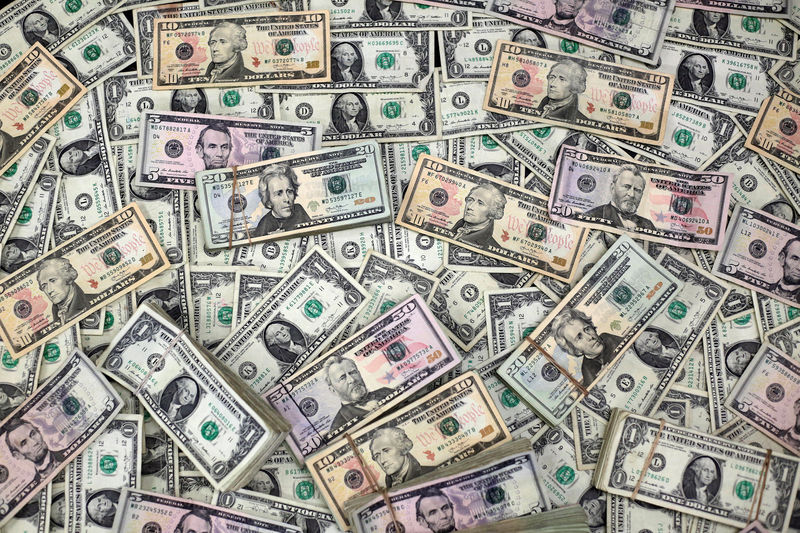By Richard Leong
NEW YORK (Reuters) - The U.S. dollar’s nosedive over the last year - only exacerbated by the recent threat of trade wars - is rekindling concerns that the greenback’s standing as the premier global reserve currency is at risk, but data compiled by Reuters suggests such fears are overblown.
Moreover, any real threat to its pre-eminent position would take years to materialize given its commanding share of global reserves and a relative paucity of alternatives.
The U.S. dollar index (DXY) fell 10 percent against a basket of currencies last year, its steepest drop since 2003, on evidence Europe, China and other nations are growing faster than the United States even as the Federal Reserve raised rates three times.
So far this year, it is down nearly 3 percent amid worries about trade tension and foreign central banks' dialing back of stimulus. It hit a three-plus year low in February.
The greenback weakened since late last week after U.S. President Donald Trump's surprise announcement to impose tariffs on imported steel and aluminum, stoking fears of an all-out global trade war.
"This administration is not global-trade friendly," said Sireen Harajli, currency strategist at Mizuho in New York. Trump's protectionist stance may have a short-term negative impact on the dollar but it may not be an enduring one, she added.
Any real threat to the dollar's pre-eminent position would take years to materialize given its commanding share of global reserves and a relative paucity of alternatives.
"I would not worry (about) the status of the dollar as the top reserve currency in the next 20 years," said Jack McIntyre, portfolio manager at Brandywine Global in Philadelphia.
The dollar’s status as the global reserve currency has been called into question since the 1980s with the introduction of the euro and China's dramatic economic ascent.
The greenback has come under additional pressure in recent months in the wake the Trump administration's contradictory views on trade.
Back in January, U.S. Treasury Secretary Steven Mnuchin at the World Economic Forum in Davos said, "Obviously a weaker dollar is good for us as it relates to trade and opportunities." A day later, Trump said he favored a "strong dollar."
"I get a sense the dollar is getting increasingly punished for the unpredictability of this administration's policy-making," said Omer Eisner, chief market analyst at Commonwealth Foreign Exchange in Washington. "That is a big question for investors despite the favorable (economic) backdrop."
But is such a fear justified?
(Graphic - Erosion of Dollar's Top Reserve Currency Status click http://reut.rs/2DFLnLD)
YELLOW CARDS
There are warning signs: China and Japan, the two largest U.S. creditors, have cooled on owning U.S. government bonds.
China’s State Administration of Foreign Exchange said it has been diversifying its foreign exchange investments. That’s coming just as Uncle Sam is looking to borrow more to finance a growing deficit from a major tax cut and the Federal Reserve is shrinking its balance.
Moreover, the share of allocated reserves that foreign governments hold in dollars as reported to the IMF has been declining in recent quarters, and the Fed’s custody holdings for overseas central banks have been falling.
Last month, China's FX reserves, the world's biggest, fell for the first time in 13 months to $3.134 trillion, retreating from the highest level since September 2016 reached in January. Its holding of U.S. Treasuries, in the meantime, has stalled after reaching $1.2 trillion back in August.
Japan, the second largest owner of U.S. government bonds, said its currency reserves edged up to $1.269 trillion in January, while its Treasuries holdings fell to $1.062 trillion, the lowest since December 2011.
While total FX reserves have grown, dollar's share of them fell for a third consecutive quarter in the fall of 2017 to 63.5 percent, its smallest since mid-2014, while the euro's and sterling's shares of reserves edge higher, according to data from the International Monetary Fund released in December.
"It's more palatable for central banks to move into euro and sterling," due to their relatively high liquidity, said Paresh Upadhyaya, director of currency at Amundi Pioneer Investments in Boston.
(Graphic - U.S. Treasuries top foreign holders click http://reut.rs/2DjHnk0)
TOO EARLY TO TELL
While the dollar's decline could persist in the foreseeable future, analysts say, its reserve currency status will not likely be in danger unless there are signs of overseas governments dumping Treasuries, a drop in dollar-denominated currency trades, and the dollar index breaking below its all-time low in 2009.
Allocated dollar reserves, reported to the IMF, rose to $6.126 trillion in the third quarter of 2017 from $5.912 trillion the prior quarter.
Average daily FX trading volume in North America last October, a proxy of dollar-based transaction, grew by 7 percent from a year earlier, the New York Federal Reserve's Foreign Exchange Committee's semi-annual survey released in January showed.
All in all, the greenback, while it has lost luster since early 2017, is not in danger of being unseated as the world's top reserve currency anytime soon.
"I don't believe the dollar is reverting to a structural decline," Amundi Pioneer's Upadhyaya said. (For a graphic of the Dollar Index v Euro click http://reut.rs/2BHqgH1)
